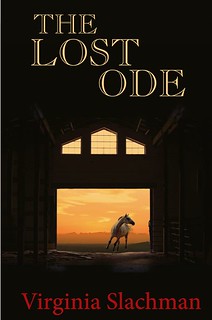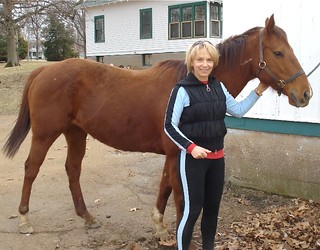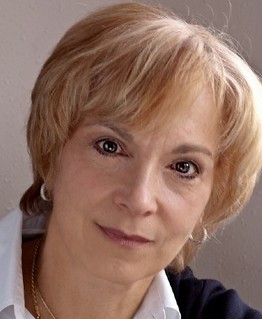Author Virginia Slachman kindly took the time to answer some questions about her writing and work with the rescue of thoroughbreds after racing.

What is it exactly that you do?
I’m a writer and college English professor by formal training, but I’ve always loved horses so I also spend quite a lot of time being involved in thoroughbred rescue, taking care of ex-racehorses who’ve been injured or otherwise removed from the racetrack. In fact, the setting for my mystery series – The Lost Ode is the first book – takes place on a stud farm in Kentucky and involves the horse racing industry.
I went to live for a time at Margaux Farm, a stud farm in Midway, Kentucky, to do research for this book. I was able to tag along with the stallion groom, the mares groom, the vet as he did checks on pregnant mares, and so on. Steve Johnson, then the owner of Margaux, was so generous to me, opening up his farm and allowing me to be privy to all aspects of how Kentucky racehorses are bred and trained. And of course I also got to meet the beautiful thoroughbreds, the people, and learn about the history as well as the darker side of the race industry.
That experience made The Lost Ode a joy to write because I could incorporate accurately a true “behind the scenes” look at a very high dollar-flashy industry. All aspects of breeding, training (and doing away with!) racehorses, is accurate in the book.
It also got me interested in helping these beautiful horses after their racing career is over. I have learned an enormous amount about how to care for and transition horses from the track to second careers. Some of them, of course, are too injured to be adopted, so the many rescue facilities dotting the United States provide a home and refuge for horses that otherwise might well be slaughtered.
How much of your day/week is related to horses?
I usually spend from three to four days with the thoroughbreds, (though there are other breeds of horse at these rescue facilities, too), doing everything from feeding, turn-out, grooming, mucking out stalls, transporting horses, medicating wounds, riding, exercising, massaging, or assisting when they are shoed or have their teeth floated, and transitioning them to new careers. . . the duties are varied and, essentially, the chores to be done depend on what the need is each day.

Thoroughbreds are very versatile; we’ve placed horses as show jumpers, barrel racers, trail horses, companions for young children and older adults, and as dressage horses. They’re intelligent and athletic and able to emotionally bond in a way that makes them incredible companions.
I love every minute I spend with the horses and, as an added bonus, being immersed in this world makes the people, and settings, and plots for my mystery series quite authentic.
In this field of work, is it possible to be a full time professional and earning a liveable income?
The great thing about volunteering is that you get to be very active in all aspects of horse care. As with most volunteer, service organizations there is always a need for help. Because of this, you can really get a feel for what is entailed in different aspects of horse care. Maybe you love grooming horses, or maybe you find that farrier work really interests you, or massage, or exercising or horse training . . . maybe the veterinary aspect of wound care or maintaining the health of horses piques your interest.
When you volunteer, you get hands-on experience that can open the door for more education, or stepping into a paid position at a stable or breeding farm. For example, until I followed a farrier around, I didn’t realize how important hoof care can be; a farrier can actually aid in correcting conformation problems through horseshoe design.
One woman I know went on to work in artificial insemination . . . the jobs in the horse industry are multitudinous. Volunteering at a facility helps get you into the horse world in an active way so you can see what might be satisfying to you.
What are the general steps taken to be employed in such a role?
As I’ve noted, the first step is to find a place where you can volunteer. Depending upon your level of expertise, you can step right in or take things more slowly, learning as you go. When I began volunteering, I knew next to nothing about horses, but now I’m comfortable in pretty much any circumstance involving them.
You get to learn their signals, how to be safe around them, how to bond (often called “hooking on”) and care for them. You learn their personalities and what treats they like –I know one stallion who loves root beer and cheesecake! So, if you have an interest in horses, jump right in!

Favourite horse memory?
What I love about working with thoroughbreds is how courageous they are. Many, though certainly not all, of the horses I’ve known in rescue have been abused. Some will not let you come close, some are head shy from being beaten, others have serious physical injuries. I’ve known horses who’ve had a fractured leg or knee and several who are missing an eye.
Horses who’ve been mistreated have every reason to be mean, angry, spiteful, even dangerous. But none of the thoroughbreds I’ve known have reacted that way. Rather, they will withdraw and not let you near them. They are very social animals, but my experience is they’d rather avoid contact than harm you. But what amazes me is they are very willing to forgive us humans, and given love and care, learn to trust us again. Never, ever doubt the power of gentleness, love, and respect to earn the trust and affection of a horse. I’ve seen it time and time again.
One horse’s story comes to thought. This mare came to the facility I was working at after being abandoned in a field. She hadn’t been fed, and was terrified of absolutely everything. You couldn’t approach her; she’d flee as if for her life. A beautiful gray with a sweet eye, black mane and tail, she was living in a pasture with a herd, but could not bring herself to join even those of her own kind.
One winter day, I found her lying down in the pasture; she’d cut her leg fairly seriously so she needed vet care. With gentleness and working very slowly, I was able to get a halter on her and, with a lot of patience, get her from the pasture to the lay-up barn. Though injured, she raced around and around in her stall, which was not helping her leg wound. At that time, there was a twenty-eight year old gelding living in the barn who I termed our “therapist” because if he sensed any horse needed a little TLC, he was always right there to help out. When he saw this mare, he went into the empty stall next to her and stuck his nose to the bars until she stopped circling and came over. They stood nose-to-nose, calmly, until the vet came and took care of the mare’s wound.
She had an extended stay in the barn to recuperate. Because of that, all the volunteers got to interact with her. Eventually, she let us groom her, walk her calmly on a lead rope, feed her treats, and generally just hang out with her. Once she was fully healed and turned back out into the pasture, she joined the herd. Now if you walk out into the field, she’ll come right over for a carrot!
Like so many thoroughbreds I’ve worked with, this mare had a lot of issues to deal with. But she worked through them and learned once again to trust humans. As I said, horses have tremendous courage and the capacity to forgive—I’ve learned a lot from them.
Future goals?
I’d love to keep learning about and caring for thoroughbreds, and am very excited about the mystery series I’m working on. The Lost Ode is available on Amazon. And I’m just now finishing up the revision of the second book in the series.
Best thing about your sport/profession?
The horses. The best thing about the work I do is getting to know and care for the horses. I especially love watching traumatized horses regain their confidence and trust as well as seeing these wonderful creatures find new, loving homes and a second career off the racetrack.
“No hour of life was lost spent in the saddle.” – Author unknown

Leave a Reply